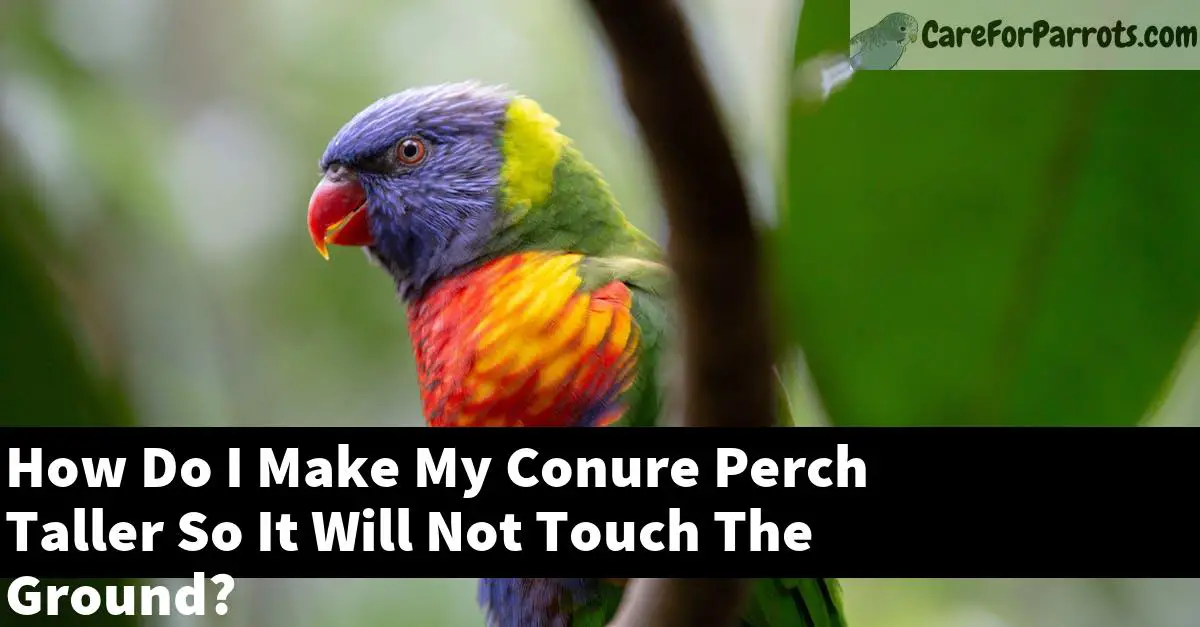There is no one definitive answer to this question, as it depends on the size, weight, and build of your conure. However, some simple tips that may help include gradually increasing the perch’s height over time, providing your conure with a variety of perching options, and placing a sturdy, elevated platform in its bird room if needed.
Table of Contents
How do I make my conure perch taller so it will not touch the ground?
You can make your conure perch taller by using a variety of methods including adding a wooden or metal dowel, using a spring or metal bracket, or using a cage stand. Each method has its own advantages and disadvantages, so you will need to choose one that works best for your bird.
What are some ways to make my conure perch taller?
There are a few ways to make your conure perch taller.
One way is to provide your conure with a taller perch.
This can be accomplished by purchasing a taller perch or by making your own perch taller.
Another way to make your conure perch taller is to provide it with a better perch surface.
This can be accomplished by purchasing a perch with a textured surface or by making your own perch surface.
Finally, you can also make your conure perch taller by providing it with more perch space.
This can be accomplished by purchasing a larger perch or by making your own perch space.
How can I prevent my conure from touching the ground?
The primary way to prevent your conure from touching the ground is to provide a perch or platform for them to rest on. This can be something as simple as a low branch in the bird’s enclosure or a specially designed perch that is elevated off the ground.
Conures also enjoy climbing, so provide plenty of sturdy climbing structures and perches to keep them entertained and engaged. Additionally, make sure the enclosure is clean and free of areas where the bird can sneak in and touch the ground.
Finally, provide plenty of toys and perches to keep your bird busy and amused.
Why is it important to keep my conure off the ground?
One of the most common problems with keeping a conure off the ground is the risk of injury. The birds are constantly in motion and can easily fall and hurt themselves.
In addition, they can also get tangled in cords and other materials that are attached to the cage, which can lead to further injury. Keeping your conure off the ground will also keep them healthier, as they won’t be constantly fighting gravity and potentially developing health problems.
What are the consequences of a conure touching the ground?
If a conure touches the ground, it can experience a number of potential consequences. Conures are highly arboreal birds, so they are used to staying off the ground.
When they touch the ground, they may be startled, and this could lead to a variety of problems. Conures can get injured if they fall from high up, and they can also get sick if they come into contact with contaminated soil.
If a conure touches the ground frequently, it may become wary of people and other birds, and may become difficult to train.
How do I know if my conure is touching the ground too much?
There are a few things you can look for to help you determine if your conure is touching the ground too much. You can watch them for any abnormal behavior, such as drooping wings, lack of movement, or changes in vocalizations.
Additionally, you can measure how much the bird is touching the ground using a stopwatch, and look for any patterns in how often they are doing this. Finally, you can also check to see if the perch they are using is providing them with a sufficient amount of support.
What are some signs that my conure is touching the ground too much?
There are a few signs that your conure may be touching the ground too much. One sign is that the bird is constantly pacing or hopping around.
Another sign is that the bird is not preening as much or is not eating or drinking as much as it used to. Lastly, if the bird is showing any other signs of being out of balance or stressed, such as being more aggressive or feather picking, then it may be time to take the bird to the vet to be evaluated.
Summary
Some simple tips to help keep your conure healthy and happy include gradually increasing the perch’s height, providing them with a variety of perching options, and placing a sturdy elevated platform in their bird room if needed.






